At RJC confab, Trump’s UN envoy says that in making bipartisanship raison d’être, pro-Israel lobby losing site of policies it supports; claims two-state solution unrealistic
By JACOB MAGID 6 November 2021
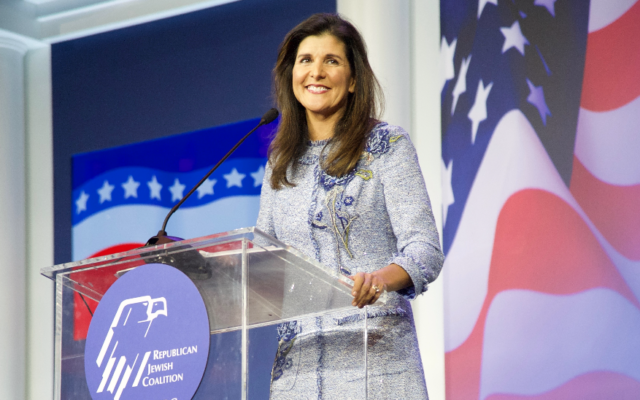
Former US ambassador to the UN Nikki Haley addresses the Republican Jewish Coalition annual conference on November 6, 2021. (Republican Jewish Coalition)
LAS VEGAS — Former United States president Donald Trump’s onetime envoy to the United Nations Nikki Halley tore into the pro-Israel lobbying group AIPAC on Saturday for hosting politicians who support the Iran nuclear deal.
“There’s one thing I don’t get about AIPAC, and I’m not saying anything to you that I haven’t said to their leadership,” she began in her speech at the Republican Jewish Coalition’s annual leadership conference in Las Vegas.
“Why do they invite politicians to their conference who strongly support the Iran nuclear deal?” she continued as the conservative crowd applauded. “Stop rewarding bad behavior. It only gets you more bad behavior.”
The comments represented rare criticism against one of the most prominent organizations in Washington by a rising star in the Republican party and possible candidate for president in 2024.
A spokesman for AIPAC declined to comment on Haley’s remarks.
The DC lobby has long worked to cultivate ties with lawmakers in both parties, leveraging them to bolster the US-Israel relationship. Presidential candidates from both parties long saw AIPAC’s annual policy conference as a necessary campaign stop on their way to the White House.
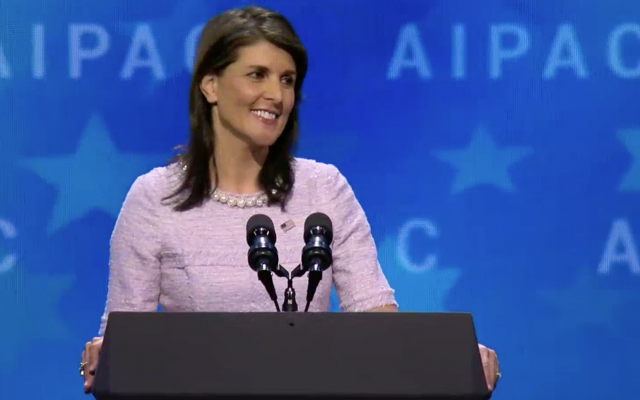
US Ambassador to the United Nations Nikki Haley speaks at the American Israel Public Affairs Committee (AIPAC) policy conference in Washington, DC, on March 5, 2018. (AIPAC screenshot)
But as Israel has become a more divisive issue in Washington, particularly following the Trump and Netanyahu governments, a growing number of Democrats have preferred to distance themselves from the pro-Israel lobby. US President Joe Biden and Vice President Kamala Harris addressed the group and met with its leaders on the campaign trail last year, but some other candidates refused to do the same.
Democratic Rep. Betty McCollum called AIPAC a “hate group” after the lobby published ads against her.
But Haley’s comments and the applause they received from the RJC crowd indicate that willingness to distance from AIPAC is growing in the Republican party as well.
“Bipartisanship is important,” Haley told RJC. “But if you make bipartisanship your whole reason for existence, then you lose sight of the policies you’re fighting for in the first place.
“If a politician supports the disastrous Iran deal, opposes moving the American embassy to Jerusalem, and is embraced by antisemites who support the BDS movement, then a pro-Israel group should have absolutely nothing to do with him or her,” she added.
The Iran nuclear deal, known as the Joint Comprehensive Plan of Action (JCPOA), which trades international sanctions relief for curbs on Iran’s nuclear program, was signed in 2015 by then-US president Barack Obama. Three years ago, Trump pulled out of the agreement following encouragement from the Israeli government.
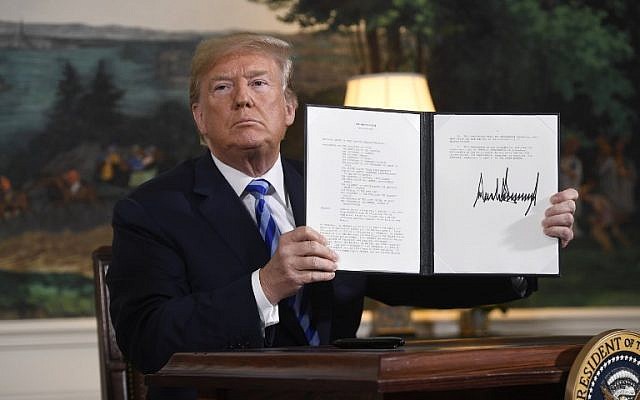
US President Donald Trump signs a document reinstating sanctions against Iran after announcing the US withdrawal from the Iran nuclear deal, in the Diplomatic Reception Room at the White House in Washington, DC, on May 8, 2018. (AFP/Saul Loeb)
The deal was roundly opposed by Republicans, and while a handful of Democrats expressed reservations at the time, the latter party’s opposition to Trump’s withdrawal from the JCPOA was effectively unanimous.
A decision by AIPAC to avoid hosting supporters of the nuclear deal to its conferences would likely leave it without any Democrats to invite.
The ex-Trump ambassador also went after the dovish J Street lobby, saying its chairman Jeremy Ben Ami has given Palestinian Authority President Mahmoud Abbas a “great big hug” when he speaks at the UN. “Supposedly they claim to be a pro-Israel organization? I will never understand that.”
J Street spokesman Logan Bayroff told the Times of Israel afterward that “it’s unsurprising that a right-wing politician like Nikki Haley would be confused and threatened by the impact of J Street. Trump apologists like her simply can’t accept the fact that the overwhelming majority of American Jews support diplomacy and pro-Israel, pro-peace policies that aim to resolve the Israeli-Palestinian conflict, not exacerbate it.”
“While Nikki Haley spends her time lauding the destructive actions of her former boss, we’ll stay focused on representing the goals and values of the majority of our community,” he added.
But Haley used much of her speech to tout her record at the UN, where she gained rockstar status among the pro-Israel establishment over her full-throttled defense of the Jewish state.
She also took the opportunity to offer some “friendly observations for the new Israeli government to consider.”
Firstly, she warned the Israeli government against trusting the Biden administration to prevent Iran from acquiring a nuclear weapon, as pledged by the US president.
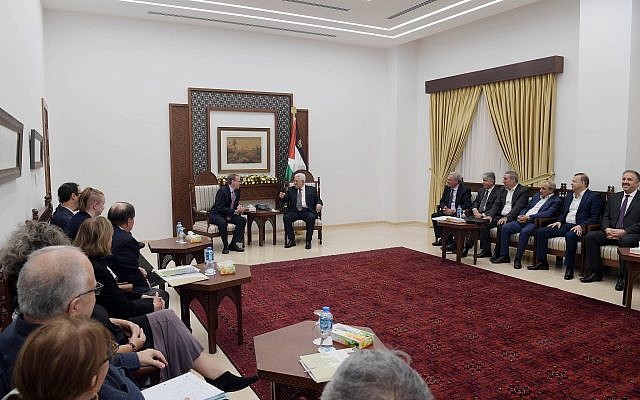
Members of the liberal Mideast policy group J Street meet with Palestinian Authority President Mahmoud Abbas at his headquarters in Ramallah, on October 17, 2018. (Courtesy)
“If Israel makes the grave decision that its security depends on removing that threat, it should not wait for an American green light that might never come,” Haley said.
Both former prime minister Benjamin Netanyahu and current premier Naftali Bennett privately agreed to a policy of “no surprises” with the Biden administration vis-à-vis Iran, an Israeli official confirmed to The Times of Israel earlier this year, though the former has attacked the latter for doing so more recently.
On the Palestinians, Haley cautioned “please remember who you are dealing with.”
She lambasted the Biden administration for renewing humanitarian aid to the Palestinians “and promoting a two-state solution.”
“Look, we can all have a nice academic debate about the merits of an independent Palestinian state. In theory, it could be a good thing. Lord knows the Palestinian people have suffered too much,” Haley said.
“But let’s be real. There is no universe today under which the corrupt Palestinian Authority can run a state. There isn’t,” she asserted, adding that Hamas in Gaza is even worse.
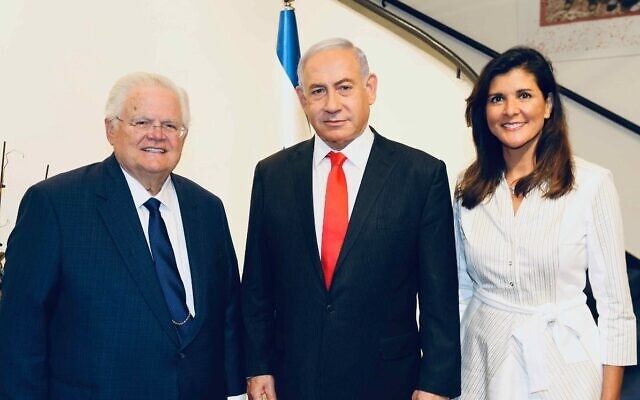
Former prime minister Benjamin Netanyahu (center) hosts CUFI president John Hagee (left) and former US ambassador to the UN Nikki Haley at the Prime Minister’s Residence in Jerualem, on June 14, 2021. (Nikki Haley/Twitter)
The former envoy went on to assert that there is “far more support” in Israel for a two-state solution than there is among Palestinians.
Recent polling indicates otherwise.
A July 2021 poll from the Israel Democracy Institute found that 40 percent of Israelis support a two-state solution. A June 2021 poll from the Palestinian Center for Policy and Survey Research found that 39% of Palestinians support the proposal.
Other surveys from recent months and years have produced similar results.
A joint survey carried out in October 2020 by the Palestinian Center for Policy and Survey Research (PSR) in Ramallah and the Evens Program in Mediation and Conflict Management at Tel Aviv University found that 43% of Palestinians support a two-state solution and 44% of Israelis support the formula.
Haley argued that the peace plan proposed by Trump “was the most comprehensive and realistic approach to ending the dispute between Israel and the Palestinians.”
Trump officials called the proposal, which envisioned Israel annexing all of its West Bank settlements, maintaining permanent security control beyond the Green Line, while offering the Palestinians a sub-sovereign, non-contiguous state, a “realistic two-state solution.” The Palestinians rejected it out of hand.
Closing her speech, Haley declared that the 2022 midterm elections will be about several key domestic issues for Republicans, “And yes, they are also about standing strong for our best ally in the Middle East.”
No comments:
Post a Comment